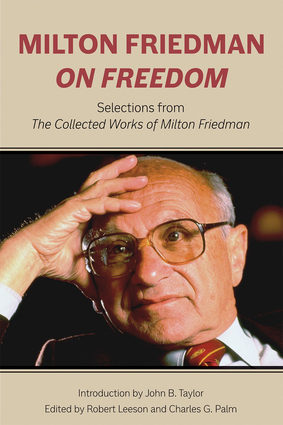
In Milton Friedman on Freedom, editors Robert Leeson and Charles G. Palm, both of the Hoover Institution, have put together many of Friedman’s most important articles and chapters that make his case for freedom. (Disclosure: I was a friend of both Milton and Rose Friedman and am a research fellow with the Hoover Institution, where Friedman was a senior fellow from 1977 to his death in 2006.)
The book is well worth reading. There is often overlap between sections so that you will read the same data or important facts three or four times in working through the chapters. Some might find this annoying; others might find that the repetition reinforces the message. In this book, you will see Friedman making mainly a consequentialist case for freedom–it works so well, giving us prosperity–even though he takes pains to point out that his case is a philosophical one based on moral relativism. Friedman is at his strongest when he draws on his economic and statistical skills. He is at his weakest in making his philosophical case.
This is from “Crusader for Liberty,” Regulation, Summer 2017, my review of Milton Friedman on Freedom.
As you’ll see from the review I liked it a lot. I did get one surprise, though. I hadn’t known to what extent Milton based his case for freedom on moral relativism. He doesn’t write it just once. It comes up a few times in the book. I wrote:
What is Milton Friedman’s basic argument for freedom? One might think that, given his emphasis on freedom’s consequences, his case is a combination of consequentialism–free markets do so well for us–and one of the standard libertarian moral arguments against the initiation of force. But at various points in the book, Friedman takes pains to say that his case for freedom is not about consequences at all but, rather, is based on our ignorance about what is moral. In a 1974 Reason interview reprinted in the book, Friedman says that if we knew for sure what sin is, then, if we saw someone sinning, we ourselves would be sinners if we didn’t forcibly prevent him from sinning. He asks, “[H]ow can you allow a man the freedom to sin?” He answers his own question: “The only answer I can give is that I cannot be absolutely certain that I know what is sin.” In a 1991 article, “Say ‘No’ to Intolerance,” Friedman repeats that argument.
I thought I knew Friedman’s thinking very well, but, I confess, I hadn’t known how strongly he believed this argument. I’m not a professional philosopher, but I suspect that philosophers could find large weaknesses in his argument. One weakness is that if we can’t know what sin is, then we don’t know what constitutes right and wrong. And if we don’t know that, how can we say that it’s wrong for the government to use force to prevent people from doing what some people regard as sinning?

READER COMMENTS
Roger Sweeny
Jun 16 2017 at 5:12pm
Friedman says that if we knew for sure what sin is, then, if we saw someone sinning, we ourselves would be sinners if we didn’t forcibly prevent him from sinning.
Which, from my experience, is pretty much how social justice warriors feel. And why they don’t feel it’s wrong to be illiberal.
Thaomas
Jun 17 2017 at 7:45am
One of the good things about Friedman was his willingness to advocate for less than first best policies.
His greatest achievement is what became the EITC. It has great potential as a part of reform packages that remove distortions such as the minimum wage and the absence of a carbon tax, which would be regressive by themselves.
Yaakov Schatz
Jun 19 2017 at 9:38am
I agree that Friedman’s argument based on the question: “[H]ow can you allow a man the freedom to sin?” is weak.
As an orthodox Jew, I find the answer very simple: “because using force against another person, unless specifically allowed by the Torah (=Jewish Law) is itself a sin.” I do not think that this is unique to Jewish law. I believe that most people and law systems would view kidnapping (locking people in Jail), theft (fines) and assault much graver sins than most of the sins that they are intended to protect against.
Use of drugs may be a sin, but so is locking people up in jail, which is a much graver sin, in just about any law system. I do not understand how people allow themselves to perform the grave sin of kidnapping, in order to “save” people from the sin of using drugs.
Leonard B Glasser
Jun 19 2017 at 8:08pm
Yaakov, The use of drugs is not a sinful act when used to relive suffering or to improve ones health. What is perhaps not sinful but unlawful is to have drugs on your person which have not been prescribed to you by a legal source. Not being a student of Torah I can only say that I agree that we lock up way too many people for small drug use. I enjoyed your comment.
Comments are closed.